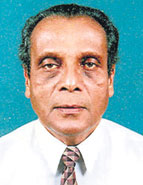Chandra de Silva died unexpectedly while playing tennis on June 10, closing a long chapter of service to the Child Protection Society of Ceylon. Chandra, as we called him, was an exceptional Sri Lankan who left a unique mark on all his undertakings. He was a respected income tax official, and then a tax consultant. He was also a hotelier with a vision; he successfully managed the eco-tourist Hotel Ranweli, in Kochchikade, which he founded with his two best friends, Ranjith Wijewardene and Mihindu Keerthiratne.
 |
Chandra was a family man par-excellence. At his funeral, hundreds of his friends spoke at length about his many remarkable achievements. As his friend for 40 years, I would like to remember Chandra for two unique contributions he made to our society: He pioneered eco-tourism in this country, and he was the flag bearer of the Child Protection Society of Ceylon (CPS). For 42 years he was the livewire of the venerable 80-year-old institution. I know of no Sri Lankan who has continuously devoted his youth, middle age and the golden years of his life so single mindedly for the protection of our destitute children.
As fate would have it, Chandra and I were discussing death only two weeks earlier, at the annual cricket encounter between the CPS Boys’ Home and the Australian High Commission, held on May 25.
Chandra was concerned about the future work of the CPS, and felt the need for an infusion of new blood. He was looking at some of the participants, men and women, who were taking part in the match.
Unusually for Chandra who was healthy and optimistic about life, he was dwelling on how the world would assess his silent contribution to social justice, after he had left the scene.
I told him the best way, following a trend in developed societies, was to write a self-obituary, assessing his own life work. It would not be an autobiography so much as a collection of personal reminiscences and thoughts that could best be expressed by the persons concerned and not by a third party. This way, I pointed out, even in death we can contribute to the welfare of the living.
Before Chandra pioneered eco-tourism in this country, in 2000, the Sri Lanka tourist industry had not seriously adopted the new eco-friendly tourist concepts. Chandra, who became an internationally recognised speaker on the subject, put his theories into practice in the Ranweli Hotel at Kochchikade. Visitors repeatedly came back to this eco-tourist hotel to immerse themselves in the study of bio-diversity, enjoying the surrounding Ranweli estuary and the excellent opportunities for bird watching.
Under Chandra’s leadership, the Eco-Tourism Society organised several training programmes for the Sri Lankan hospitality industry, helped by international experts. Along with Professor Sarath Kotagama, he compiled an internationally hailed essay on the eco-tourism potential of Medirigiriya.
More than anything, Chandra showed his love of life in his unqualified devotion to the Child Protection Society of Ceylon for 42 years. I have never seen an individual, here or abroad, so committed to the cause of underprivileged children. Unlike his work in public eco-tourism, Chandra kept his involvement with the CPS more confidential. He worked every other Saturday at the Boys’ Home in Pamunuwa, Maharagama, a model home for traumatised children. The venerable society, founded in 1928, maintains a boys’ home in Pamunuwa and a girls’ home in Rukmale.
Chandra had elaborate plans for commemorating the 80th anniversary of the CPS, which falls next month. In the Boys’ Home, he spoke to each child and came to know his mental make-up. When a child needed emotional security, he arranged for medical experts to attend to the children. His vision was to make the children, mostly orphans, into useful citizens of the country. This was no easy task, but the CPS achieved some success because this became the only boys’ home in Sri Lanka to have an Old Boys’ Union.
It was poignant to see Chandra’s coffin being carried to the crematorium by the young boys of the CPS Boys’ Home. They were an integral part of Chandra’s extended family.
In accordance with his last wishes, Chandra’s wife Shirleen offered food to the children at the Boys’ and the Girls’ Homes seven days after his death. The boys had already performed a religious ceremony by chanting pirith on the occasion of the opening for worship of a Bodhi sapling at the boys’ home, brought from India on June 14, with three Buddhist priests participating.
Remembering Chandra as a rare human being will bring happiness to his wife Shirlene, daughters Yasmin and Shayanika, friends and the staff and children of the CPS Boys’ and Girls’ Homes.
By S. S. Wijeratne |

